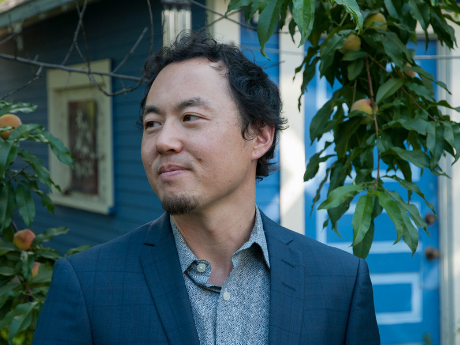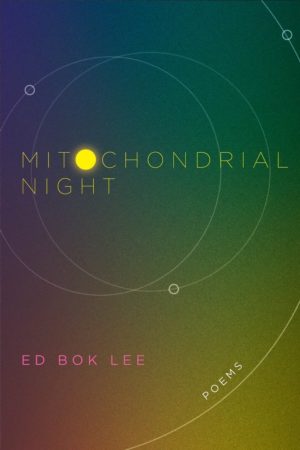In Their Own Words
Ed Bok Lee on “The Desert vs. the Sea”

The Desert vs. the Sea
Tonight you can hear the desert and sea
arguing again. The old desert insists
on knowing who stripped all its green.
The ghost sea can only spray more sand
and weep.
Did you know, in any iteration of eternity,
you can send back the heart you are
presently scheduled to depart with when old?
Just erase any trace of who you think you should be.
Fuller than all futures
were to you as a child, the heart I mean
doesn't care if it houses a body.
And not any prophet's heart by proxy;
but a heart that returns from a long journey of its own, widened
like hips or jowls; fed in the sweet
orchard of attempts and regrets;
a heart that can finally receive but doesn't need
what it loves to give.
Like those freest birds who chirp at the zoo,
alighting with snippets of news
for the lumbering hearts long blind behind rusted bars and grids of wire.
In the desert, they arrive onto a cholla—
candy-blue wings and fast clicks
warning the quail, who warn the jackrabbits,
who inform the squirrels of a snake or coyote's sultry approach.
And afterward, with softening notes
from such small-plumed throats,
they linger to chirp old tales of
plankton and whales.
"The Desert vs. the Sea" used by permission fromMitochondrial Night (Coffee House Press, 2019). Copyright © 2019 by Ed Bok Lee.
On “The Desert vs. the Sea”
Many years ago, I spent some time at a Buddhist temple in South Korea. This was around the time I finally returned half of my father’s ashes back to our ancestral mountain in Chungcheong Province. While staying and practicing at the twelve-hundred year old temple, I came across a koan about a young monk whose master had sequestered himself away in deep meditation for many years.
One day, while the young monk was running errands in a nearby village, one villager asked him how the great master was doing. The young monk informed that the master lately only ate, sat, and lay down in deep meditation. The villager replied: "If that's the case, he will be reborn an ox." This angered and insulted the student, who replied that the master was the greatest Buddhist scholar in the land, and would certainly go to heaven after death. The villager corrected the young monk. "That's not the best response." "What is the best response, then?" said the young monk. The villager suggested that the young monk could have answered that if the master were in fact to be reborn as an ox, then the master would certainly be reborn an ox with no nostrils. The villager then departed. The young monk, perplexed, hurried back to the monastery and informed the great master what the villager had said. To the young monk's astonishment, the Buddhist master leapt up from the floor, and, after many years of silence, shouted excitedly: "Yes, yes, that's it! After long last, I finally understand!"
But what did the old master finally understand?
There are different archival interpretations. It's important to remember that cows and oxen, beasts of burden, were back then commonly yoked through their nostrils into servitude. If an ox has no nostrils, it can't be yoked. This is the most common interpretation: that the master would surely return in the next life as a free creature. But, at the time, maybe because of many things I was experiencing personally, I approached the koan more sensorially. If an ox has no nostrils, yes, it can not be yoked through the nose, but could it not still be yoked through the mouth or harnessed into enslavement by some other physical or mental means? At the time, none of the existing interpretations about yokes and nostrils and eureka moments of enlightenment felt like the deepest truth to me. Because, actually, having no nostrils could be a terrible, stifling existence, even if you were not enslaved. After much thought, finally, what I personally derived from the koan was that if one was going to fully commit oneself to a pursuit of enlightenment, one must assume that in the next life it will be an even more difficult physical existence; more challenging to do so. This felt true to the koan. And so, if seeking enlightenment were to become even more challenging in the next life, are you really sure you want to spend this life in the arduous pursuit of greater enlightenment? How all in are you, really—if, let's say, in the life after the next life, it will be even more arduous and there will be even greater physical and mental struggle and even humiliation in your effort to become enlightened, and so on, ad infinitum. So, really, truly, what is your commitment to enlightenment in this lifetime? Are you really committed, iteration after iteration, to greater and greater (at best) struggle (and, surely, at times, greater suffering) in the pursuit of greater enlightenment? It's easy to be committed if you believe greater enlightenment is akin to a kind of heaven or transcendence in this world or the next. But what if greater enlightenment or transcendence is more akin to not only a beast of burden with no nostrils, but a creature, eventually, with no mouth, no legs, no ears, no eyes, etc.? Are you still committed to such struggle? Or is your seeking enlightenment conditional and rooted in something, say, like the ego? I became convinced that the only definition of true enlightenment is a constant seeking of enlightenment amid increasingly arduous struggle ad infinitum.
Years later, while living for a few months in the high desert (which was once the bottom of a sea, once a kind of rainforest, once many other kinds of ecosystems over the eons), I wrote this poem, "The Desert vs. The Sea." Reflecting on my time at the Buddhist temple, as well as Wallace Stevens' line: "Death is the mother of beauty," I also considered Nietzsche's concept of eternal recurrence and a quote by Mark Twain: "If you gaze for long into an abyss, the abyss gazes also into you." At first, of course, whatever stares back can be frightening…possibly benevolent…more likely nothing at all recognizable. Eventually, all the illusions and delusions and fantasies burn away, and all you have is a kind of radical aliveness peering back. For some, it's God. For others, it's enlightenment, etc. I thought: what if you did return as a living, breathing ox but without a brain? Would that be Lethe or God or ultimate enlightenment? And what if you returned as an ox without anything but a heart; or, metaphorically speaking, pure heartness? And finally, as I began to consider the themes of the poems in Mitochondrial Night, what if you were reduced to just a single cell in a Petrie dish in the next life? What more important things might there be in that cell beyond heart energy?



